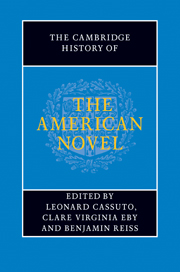Book contents
- Frontmatter
- General Introduction
- PART ONE INVENTING THE AMERICAN NOVEL
- PART TWO REALISM, PROTEST, ACCOMMODATION
- Introduction: realism, protest, accommodation
- 17 Realism and radicalism: the school of Howells
- 18 James, pragmatism, and the realist ideal
- 19 Theories of the American novel in the age of realism
- 20 The novel in postbellum print culture
- 21 Twain, class, and the Gilded Age
- 22 Dreiser and the city
- 23 Novels of civic protest
- 24 Novels of American business, industry, and consumerism
- 25 New Americans and the immigrant novel
- 26 Cather and the regional imagination
- 27 Wharton, marriage, and the New Woman
- 28 The postbellum race novel
- 29 The African American novel after Reconstruction
- 30 The rise of naturalism
- 31 Imagining the frontier
- 32 Imperialism, Orientalism, and empire
- 33 The hemispheric novel in the post-revolutionary era
- 34 The woman's novel beyond sentimentalism
- 35 Dime novels and the rise of mass-market genres
- 36 Readers and reading groups
- PART THREE MODERNISM AND BEYOND
- PART FOUR CONTEMPORARY FORMATIONS
- A selected bibliography
- Index
29 - The African American novel after Reconstruction
from PART TWO - REALISM, PROTEST, ACCOMMODATION
Published online by Cambridge University Press: 28 July 2011
- Frontmatter
- General Introduction
- PART ONE INVENTING THE AMERICAN NOVEL
- PART TWO REALISM, PROTEST, ACCOMMODATION
- Introduction: realism, protest, accommodation
- 17 Realism and radicalism: the school of Howells
- 18 James, pragmatism, and the realist ideal
- 19 Theories of the American novel in the age of realism
- 20 The novel in postbellum print culture
- 21 Twain, class, and the Gilded Age
- 22 Dreiser and the city
- 23 Novels of civic protest
- 24 Novels of American business, industry, and consumerism
- 25 New Americans and the immigrant novel
- 26 Cather and the regional imagination
- 27 Wharton, marriage, and the New Woman
- 28 The postbellum race novel
- 29 The African American novel after Reconstruction
- 30 The rise of naturalism
- 31 Imagining the frontier
- 32 Imperialism, Orientalism, and empire
- 33 The hemispheric novel in the post-revolutionary era
- 34 The woman's novel beyond sentimentalism
- 35 Dime novels and the rise of mass-market genres
- 36 Readers and reading groups
- PART THREE MODERNISM AND BEYOND
- PART FOUR CONTEMPORARY FORMATIONS
- A selected bibliography
- Index
Summary
From the 1880s to the 1920s, African American novels explore what W. E. B. Du Bois identified in his Souls of Black Folk (1903) as the new century's dominant crisis: “the problem of the color-line – the relation of the darker to the lighter races of men.” Such novels also incorporate, and at times revise, influential elements from existing African American expressive, performative, and narrative traditions. Recalling the concerns of pre-Civil War African American novelists, the post-Reconstruction works retain a focus on the South, with its landscape, idioms, religions, rituals, and historical connections to slavery and the slave trade. As other authors in this volume note, the South and Southern slavery haunt the imaginations of the earliest American writers. John Ernest, for example, connects “the emergence of African Americans in American novels” to early national debates about meanings of race and the morality of the traffic in human bodies. Robert S. Levine identifies “cultural discourses” of Southern slavery in early novels such as William Wells Brown's Clotel; or, The President's Daughter (1853), while Jennifer Greeson considers the South as a touchstone which enables American novelists to critique the nation's march toward modernity.
I would add to this conversation that, rather than romanticize or demonize the region, African American novelists of the transitional, post-Reconstruction generation portray the South as a complex, multifaceted place: as a symbol of the former slaves' contested claims to citizenship and equality; as America's violent, fratricidal shadow; as source of a dynamic black culture grounded in an African heritage; as a potentially powerful nexus of African American educational, political, and economic achievement.
- Type
- Chapter
- Information
- The Cambridge History of the American Novel , pp. 484 - 498Publisher: Cambridge University PressPrint publication year: 2011



